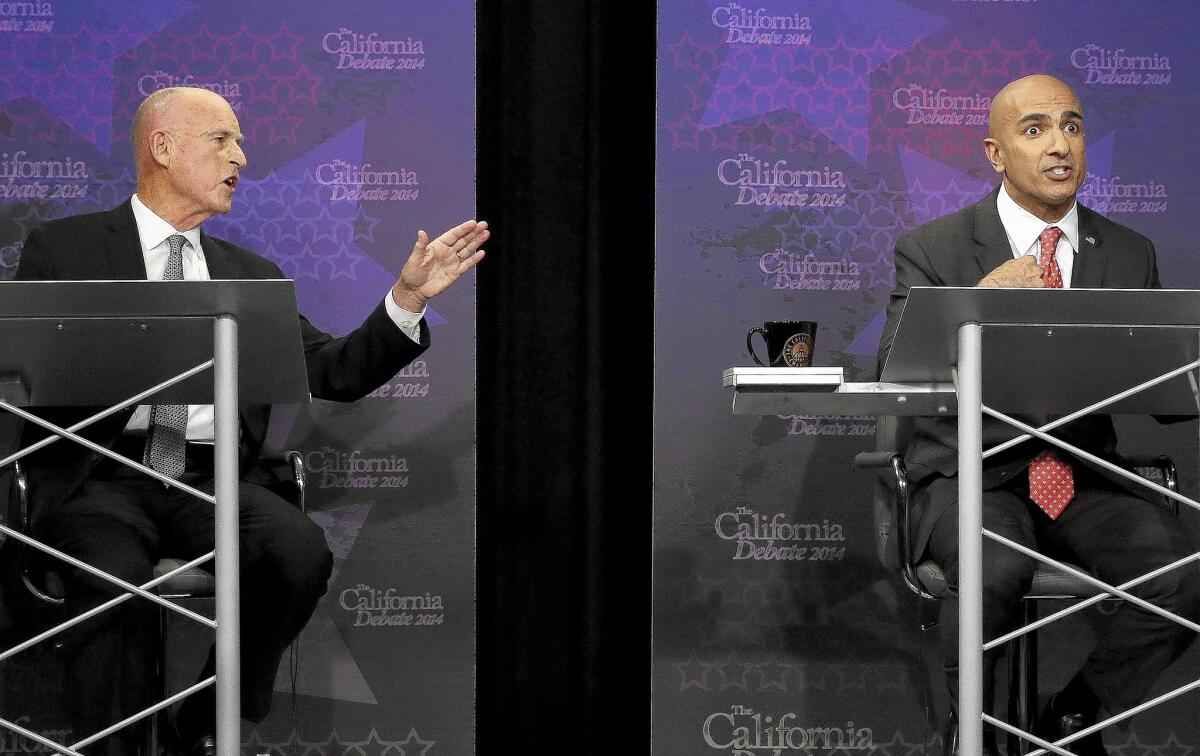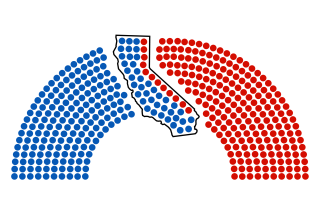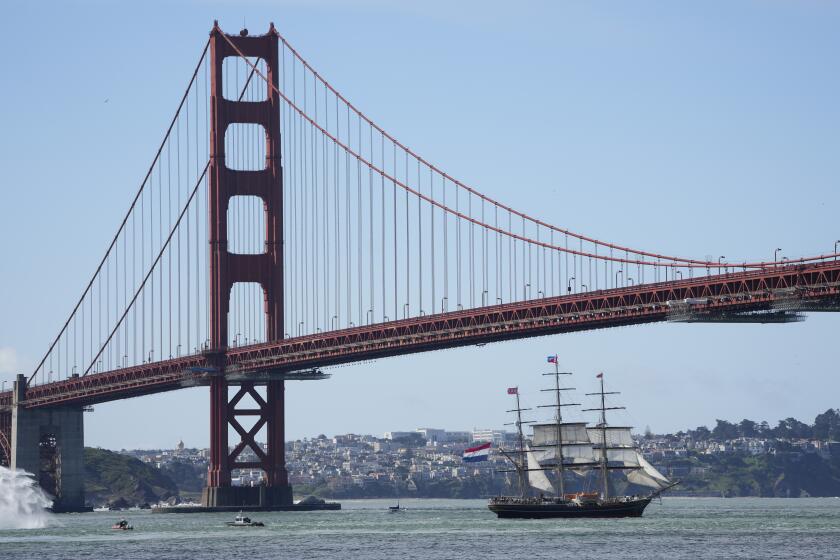Kashkari struggles to hit partisan balance in debate with Gov. Brown

To Californians who shun Republicans, gubernatorial hopeful Neel Kashkari takes pains to show he’d break with party tradition if elected: He backs same-sex marriage, federal action against global warming and drivers licenses for immigrants who are in the country illegally.
At the same time, he tries to reassure Republicans that he’d uphold conservative values. He promises to fight “union bosses,” stop what he calls reckless spending on a $68-billion bullet train and slash environmental rules that can hamstring business.
It’s a dilemma that bedevils not just Kashkari, but all of the party’s statewide candidates for the foreseeable future: how to be just enough of a Republican, but not too much.
After two decades of steady decline for the party, fewer than 3 in 10 California voters are Republican. To offend them is to risk losing a core constituency. To cater to them too aggressively is to ensure defeat.
“It’s about survival and relevance,” said Kevin Spillane, a Republican strategist who has tried for years to prod the state GOP beyond its base of older white conservatives. “If we’re just engaged in lip service, then we will be wiped from the political map of California.”
In his televised debate Thursday night with Gov. Jerry Brown, Kashkari repeatedly ran from his party’s brand, often described even by Republicans as toxic in California.
The former U.S. Treasury official, who ran the federal bank bailout, told viewers that as a son of immigrants from India, he’d grown up as a “brown kid.” He said he was now more committed than the Democratic incumbent to ensuring a decent education for poor and minority children.
Kashkari also sought to score points on the environment, saying that — unlike some Republicans — he believes in climate change. He criticized the California law that penalizes polluters as part of a state program to curb global warming, which he sees as a federal matter. But Kashkari framed the issue as one of protecting the middle class from higher fuel prices.
“It is not fair to wallop working families by raising their gas and utility prices,” Kashkari said.
And while the national party has fought to repeal Obamacare, Kashkari said he wanted only to adjust it by removing what he called its incentive for employers to cut full-time workers. “I don’t want to chuck it,” he said.
So far, there is no evidence that Kashkari’s approach is working. A Field Poll released Thursday morning found Brown leading his opponent, 50% to 34%. The survey also affirmed how crucial it is for Kashkari to maintain his party’s support: 77% of Republicans and 71% of conservatives backed him — far more than any other group.
So even as he seemed to reach out to Democrats and independents, Kashkari used Thursday’s debate to heap praise on Wisconsin Gov. Scott Walker, a hero among Republicans for his pitched battle against public employee unions. And he mocked Brown for joining environmentalists in supporting a bill to ban plastic grocery bags across the state.
“No chance would I sign that,” Kashkari said.
Kashkari’s emphasis, though, was government spending and the economy, an area in which the Republican Party has long found success in a state famously averse to taxes.
At times, the message was muddled. Kashkari pounded Brown for the bullet train, yet faulted the governor for spending too little on school and reservoir construction. His overall point was that Brown had managed the state’s finances poorly and neglected California’s economy.
Brown was not an easy target: A fixture of California politics for more than four decades, he has long positioned himself as a fiscal conservative, making it hard for Kashkari’s argument to work.
The governor took credit Thursday for closing the state’s $26-billion deficit and accelerating its debt repayments — including what he called the “credit card” bills run up by California’s last Republican governor, Arnold Schwarzenegger.
Schwarzenegger is one of the few Republicans to have won statewide office in the 20 years since Gov. Pete Wilson’s campaign against illegal immigration sparked a surge in Latino and Asian voter registration. The party has never recovered.
But Schwarzenegger was an anomaly — a Hollywood superstar who won office in the extraordinary circumstances of the 2003 gubernatorial recall.
For Kashkari, the problem “isn’t just articulating more moderate stands on very specific issues using some kind of checklist,” said Darry Sragow, a veteran Democratic strategist based in Los Angeles. “It really is a more fundamental tonal problem that the party has. And that, he cannot fix by himself.”
michael.finnegan@latimes.com
Twitter: @finneganLAT
seema.mehta@latimes.com
Twitter: @LATSeema
More to Read
Start your day right
Sign up for Essential California for news, features and recommendations from the L.A. Times and beyond in your inbox six days a week.
You may occasionally receive promotional content from the Los Angeles Times.








